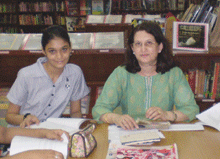French is the most widely spoken language in the world after English, and the only tongue also spoken in five continents. Moreover it is the working language of the UN, Unesco, and the IOC
With globalisation and globe-trotting for business and pleasure becoming routine, knowledge of foreign languages is assuming great importance. Cross-border corporate collaborations are becoming the norm, and so are Indian companies venturing abroad and foreign companies planting their flags in India. Little wonder Indian students are flocking to foreign language learning schools, with la langue Français (the French language) topping the popularity chart.
For most students, learning a foreign language is value addition to the qualifications they have acquired in science and technology, commerce, law, public affairs or secretarial skills. However a growing number are starting to study foreign languages to make careers as teachers, translators, and interpreters — sectors in which job opportunities are expanding rapidly.
While learning any global language is advantageous, most outward looking Indians prefer to learn French, a robust language that’s useful throughout the world. French is versatile — the second most widely spoken language in the world after English, and the only tongue also spoken in five continents. Moreover it’s the working language of the UN, Unesco, NATO, International Olympic Committee and several other international bodies.
Most Indian universities offer foreign language study programmes at the graduate, postgraduate and doctorate levels. But for postgraduate linguistic studies, the best and most popular programmes are offered by the School of Languages, Jawaharlal Nehru University (JNU), New Delhi. JNU offers BA (Hons), MA, M.Phil/Ph D programmes in French as well as diploma and certificate courses.
The Central Institute of English and Foreign Languages (CIEFL), Hyderabad also offers an advanced diploma in French and a diploma in French translation. JNU and CIEFL conduct specialist postgraduate training courses to develop students’ translation and interpretation skills.
Universities apart, the Alliance Francaise de India has a variety of popular diploma and certificate courses, with the curriculum prescribed by the French ministry of education. In addition to avant-garde pedagogies, Alliance Francaise also offers exchange and scholarship programmes as well as learning placements in France. For those who opt for teaching the language, a Master’s degree in French is mandatory, while to teach in universities an M.Phil/Ph D is the minimum formal qualification required.
The newly emergent global economy has thrown up well-remunerated employment opportunities for French teachers and translators on full-time as well as part-time basis. Employment opportunities in the corporate sector have widened from traditional areas like airlines, hotels, and embassies to IT, pharmaceuticals, exports, banking and BPO sectors. In the circumstances it’s hardly surprising that the take-home pay of French teachers ranges between Rs.30,000-50,000 per month, and private tutors charge between Rs.150-250 per hour per student, while translators charge Rs.2.50-5 per word.
 “French literacy and fluency offers greater opportunities since the language is widely spoken in Western Europe, Canada and several African countries. Moreover Indo-French trade and cultural relations have been accele-rating, with more French delegations visiting, more corporate collaborations, and a growing number of Indo-French seminars, conferences, exhibitions and trade fairs,” says Amba Mugve, French coordinator at Mumbai’s famous Cathedral and John Connon School.
“French literacy and fluency offers greater opportunities since the language is widely spoken in Western Europe, Canada and several African countries. Moreover Indo-French trade and cultural relations have been accele-rating, with more French delegations visiting, more corporate collaborations, and a growing number of Indo-French seminars, conferences, exhibitions and trade fairs,” says Amba Mugve, French coordinator at Mumbai’s famous Cathedral and John Connon School.
Born and raised in Kenya where they followed the British system of education, Mugve got a sound grounding in French, studying the language from class IV onwards. With political trouble brewing in Kenya, she went to the UK to complete her ‘A’ levels and acquired an arts degree in French, German, and philosophy from the University of London. The following year, she attained a postgraduate diploma in business administration from Ealing College, London.
Mugve began her professional career with British Leyland, London, where she managed their brands in motor shows in Europe. “My knowledge of French proved very useful when I was sent to the Paris and German Motor Shows,” recalls Mugve. In 1977 she returned to Bombay to get married, and worked with Tata Exports dealing with Switzerland and Germany while managing a lot of translation work. Subsequently in 1996 she accepted a full-time job at the Cathedral & John Connon School, where she currently heads the department of French.
“I’m lucky to be in a school which has a fine tradition of teaching French and a huge library of French books and material. It’s not difficult to learn this language if one has the right attitude and dose of passion,” says Mugve.
With linguistic diversity gaining importance, there’s a severe shortage of experienced French teachers and translators. “There are ample opportunities to make a career from learning this hip language,” says Mugve.
Indra Gidwani (Mumbai)